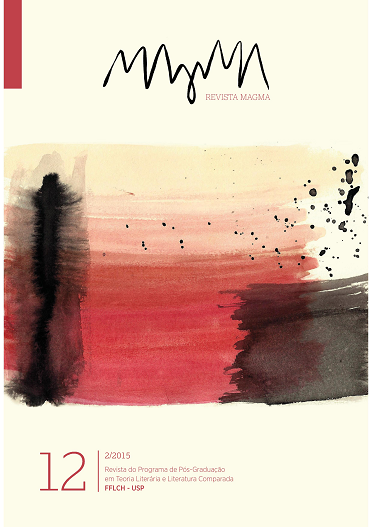Vox poetae, vox diaboli – considerações sobre o juízo goethiano e a linguagem mefistofélica na primeira parte do Fausto de Goethe
DOI:
https://doi.org/10.11606/issn.2448-1769.mag.2015.96784Keywords:
Faust, Goethe, mephistophelian discourse, authorial stance, German sociocultural contextAbstract
Notwithstanding the fact that the first printed book to mention the legend of Faust was the anonymous text edited by Johann Spiess in 1587, the Faustian theme surely owes its spread and perpetuity in Western imagination to the tragedy written by J. W. von Goethe in the nineteenth century, especially to its first part, published in 1808. Bearing in mind that Goethe admittedly assigns a fundamental role to the demon Mephistopheles when recreating the Faustian myth, this paper aims at interpreting the mephistophelian discourse in Goethian Faust as the vehicle for a critical albeit ironical authorial stance regarding certain aspects of the German sociocultural context in Goethe’s day and ageDownloads
Download data is not yet available.
Downloads
Published
2015-12-15
Issue
Section
TECTÔNICAS
License
Autores que publicam nesta revista concordam com os seguintes termos:
- Autores mantém os direitos autorais e concedem à revista o direito de primeira publicação, com o trabalho simultaneamente licenciado sob a Licença Creative Commons Attribution CC-BY-NC-ND que permite o compartilhamento do trabalho com reconhecimento da autoria e publicação inicial nesta revista.
- Autores têm autorização para assumir contratos adicionais separadamente, para distribuição não-exclusiva da versão do trabalho publicada nesta revista (ex.: publicar em repositório institucional ou como capítulo de livro), com reconhecimento de autoria e publicação inicial nesta revista.
- Autores têm permissão e são estimulados a publicar e distribuir seu trabalho online (ex.: em repositórios institucionais ou na sua página pessoal) a qualquer ponto antes ou durante o processo editorial, já que isso pode gerar alterações produtivas, bem como aumentar o impacto e a citação do trabalho publicado (Veja O Efeito do Acesso Livre).
How to Cite
Souza, L. de. (2015). Vox poetae, vox diaboli – considerações sobre o juízo goethiano e a linguagem mefistofélica na primeira parte do Fausto de Goethe. Magma, 22(12), 35-50. https://doi.org/10.11606/issn.2448-1769.mag.2015.96784



